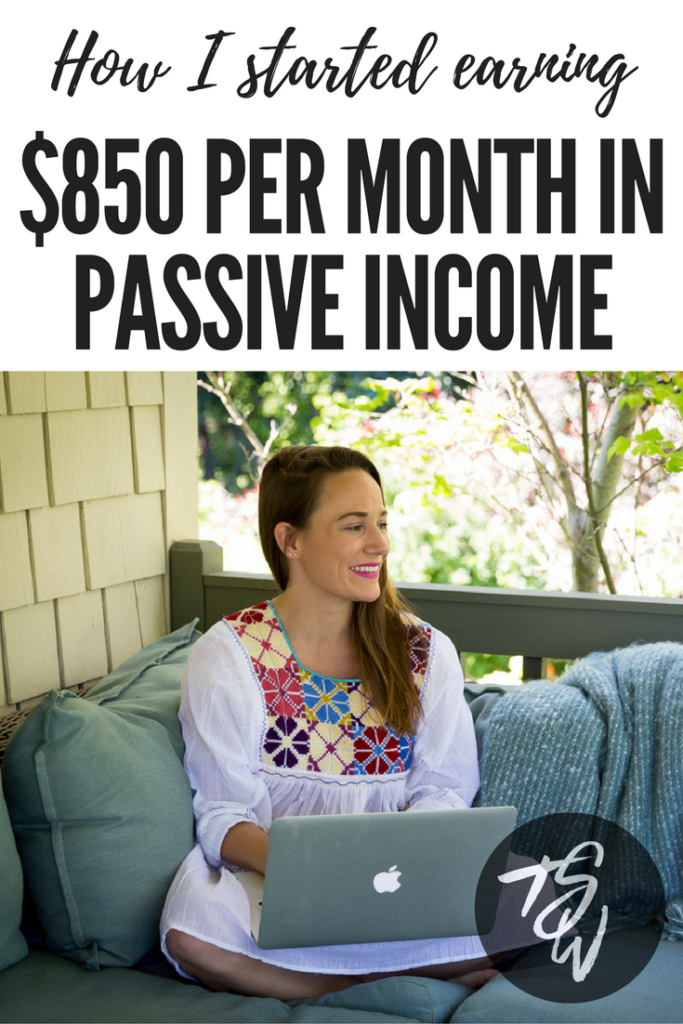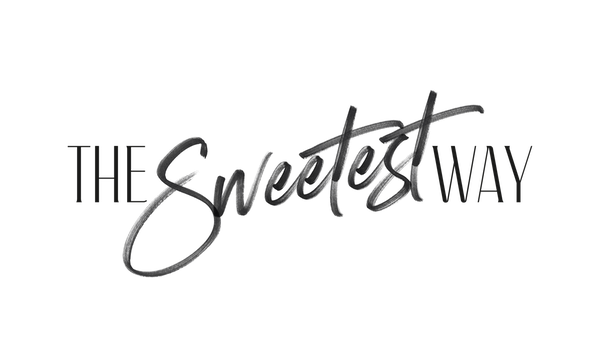Ahh, passive income. The holy grail of blogging, am I right? You know, the money you earn even when you’re not actively working, or even while you’re sleeping soundly at night?
Yeah, passive income is a pretty amazing thing.
And I’ll admit, it’s one of my biggest goals for the coming year. To create more of it, to put better systems in place, and to free up more of my time for the creative tasks that I truly, wholeheartedly enjoy (like writing).
Of course, if you’re new to the blogosphere, let me set the record straight: In the beginning, passive income is anything but passive.
In fact, it requires a boatload of work up-front. The idea is to put in that work now and reap the benefits later. That’s generally how passive income works, and yes, the word passive is totally deceiving in this scenario.
Passive income is not a get rich quick scheme. It’s not even necessarily a get rich someday scheme.
It’s just a way to bring in some extra cash so you can stress less about paying your bills, free up more of your time to spend with loved ones, or put more of your energy toward the things in life that you love.
For bloggers and digital nomads, passive income brings us one step closer to living the life we want, with the perfect balance of work that fulfills us and plenty of time for play.
Read related posts:
- How to Build a Beautiful Blog
- How I Earn Money Online as a Digital Nomad
- How 15 Location Independent Bloggers Make Money Working from Anywhere
- Become a Full-Time Freelance Writer
- Earn Cash Online in Your Spare Time with Swagbucks
5 Things I Did to Create More Passive Income This Year
I created my first digital product – Additional earnings: $30-100/month
You’ve probably heard me droning on about this project all year because it was a huge step for me and something I still to this day feel extremely proud of accomplishing.
I’ll be the first to admit, though, that my eBook launch didn’t exactly go as well as I’d hoped.
When I released Take Your Life Back: Finding Freedom Through Location Independence earlier this year, the month leading up to it was crazy, stressful, and totally the wrong moment to be attempting such a huge undertaking.
Nevertheless, I pre-sold a number of copies to the targeted email list I’d been building up, and that alone gave me the motivation to keep going.
Even now, sales are still not where I’d like them to be, but without doing much, I consistently earn an additional $30-100 per month through sales of my own product.
If you have a blog that you genuinely want to turn into a business, I suggest creating your own digital products to sell. It’s a source of income that will continue to be fruitful long after you’ve put in the initial effort.
This will certainly not be the last digital product I create–in fact, I hope to base my business around them entirely in the coming years.
UPDATE: In April 2017, I updated and re-released my ebook at a higher price point. Monthly earnings from ebook sales have since been ranging from $100-150.
I turned over my ad inventory to Mediavine – Additional earnings: $150/month
Before this year, I had only dabbled in display ads and never really saw a great return from using them.
Of course, I was going about it in a very haphazard way, slapping a few Google ads here and there and hoping for the best.
On a good month, I was making $40 using this method. And the worst part was, Google wouldn’t even pay me until I reached their $100 threshold, so I was only seeing payments once every three months.
Luckily, I discovered a better way.
In September of 2015, I got rid of every last Google ad on my site and handed over control of my ad inventory to the new publisher network on the block, Mediavine.
I knew of other travel bloggers that were having success with them, and after reading more glowing reviews on their website, it couldn’t have been an easier decision.
The team at Mediavine takes care of everything–determining optimal ad placement, running the ad server, and managing your advertiser relationships.
They have advertisers’ trust, so they’re able to secure much higher rates, which equates to more earnings for you. In short, they have been an absolute dream to work with.
In my very first month using Mediavine (and with no major increase in traffic), my new ads netted me $211.53 in earnings.
Mediavine does take a percentage of your earnings as their fee, (25%) but you never see that money, so you never really have a chance to miss it. And the increased earnings MORE than make up for it.
Not too shabby, if you ask me!
UPDATE: Ad earnings have steadily increased over time and with consistent traffic. In January of 2018, I earned $650 from my Mediavine ads and I expect to earn even more in February!
I improved my affiliate marketing strategy – Additional earnings: $400-600/month
This year, I knew that affiliate marketing would become a much more important source of income for me.
However, I knew that I wouldn’t be able to do it all on my own, piecing together a strategy from what I was able to find through Google.
The search for the perfect affiliate marketing course led me to one of the best investments of my blogging career:
Making Sense of Affiliate Marketing
Before joining this course, I knew the very basics of affiliate marketing but had mostly focused my efforts on Amazon’s affiliate program with very minimal success.
In fact, before October of this year, I was making a depressing $10-15 per month through Amazon, and little elsewhere.
Making Sense of Affiliate Marketing opened my eyes to a world of possibilities and pushed me to think outside the box when it came to which products and services to promote, where to find them, and how to increase conversions.
Before learning from a true expert I was just poking around, hoping and praying that at some point, things would just fall into place.
Michelle’s course gave me the direction I needed to start producing content that converts, and in my first few months out of the course I’ve already seen massive improvements.
A large part of my success has been due to joining more affiliate networks that I didn’t know about before which have allowed me to find a wider variety of things to promote. In addition to Amazon, I’m now promoting products through:
Many companies have in-house affiliate programs, so I’m also promoting several products as a direct affiliate. Some examples of this would include my affiliate partnership my with my hosting provider, Bluehost or the Superstar Blogging course.
After finding and joining more affiliate programs, I then proceeded to update my existing posts, beginning with those that were already bringing me a lot of traffic on a consistent basis. Those old posts were leaving a ton of money on the table every month!
And for every new post I publish, I have a proper content strategy to follow.
My first month out of the course, I earned more than $500 through affiliate marketing, and I have my sights set on earning much, much more than that in the coming months.
Needless to say, Making Sense of Affiliate Marketing pays for itself.
I joined BoardBooster and revamped my Pinterest strategy
For most of 2016, my Pinterest strategy revolved around scheduling pins through the third-party app, Tailwind. And while Tailwind has some amazing benefits (their analytics are seriously impressive) and is one of the more user-friendly apps I’d ever tried, I felt like my Pinterest traffic had hit a wall and I was ready to try something new to shake things up.
Enter: BoardBooster
I’d known about BoardBooster for a long time but at first glance, it had always seemed intimidating. The more positive reviews I read about it, however, the more eager I became to try it out for myself.
Within the first week, I was hooked.
The primary reason? It allows for something that Tailwind never did–total hands-off automation.
Whereas with Tailwind I had to spend at least an hour each week scheduling out pins for the next 7 days, BoardBooster allowed me to truly “set it and forget it.”
I could set up some boards with the Scheduler and Looping functions and pins would be added to my profile ad infinitum.
Of course, there’s a lot more to it than that, but the fact of the matter was, it allowed me to think less about Pinterest and more about creating killer content–and yes, my Pinterest referral traffic has increased since I made the switch!
Here’s a great video that explains how to use BoardBooster’s Looping function:
While not a direct source of income itself, the increased traffic I’m receiving from Pinterest will contribute to additional affiliate sales and more revenue from display ads, not to mention position me more favorably for other types of income opportunities like sponsored posts and brand partnerships.
I don’t believe you need to have millions of page views a month to run a profitable blogging operation, but more traffic certainly doesn’t hurt!
UPDATE: I recently joined a Pinterest course to uplevel my Pinterest knowledge even further, and the payoff has been enormous. The course also convinced me to switch back to Tailwind, which I am currently using for scheduling. Learn how to rock your own Pinterest account with Pinterest Organic Traffic Avalanche.
I switched from MailChimp to ConvertKit
Building my email list became one of my top priorities this year for a couple of reasons.
First, I rebranded my site in May in order to better serve my readers and give them more valuable information and the tools to build a location independent lifestyle.
This meant that my newsletters and email blasts would be carrying a different message than before, and many of my “original” subscribers might not be the best fit anymore.
Additionally, because I was launching my eBook, I needed to attract an even more targeted audience who might be interested in purchasing my product.
MailChimp was a good option when I was a new blogger with a small list and not much money to invest in my blog, but eventually, I knew I’d need a more powerful email marketing solution.
ConvertKit fit the bill.
Despite paying more for ConvertKit’s services than I was paying for Mailchimp ($50 per month versus $0), the switch has been more than worth it. ConvertKit offers far more features than MailChimp, which I’ve detailed in this post which better explains why I made the switch.
I now have several different opt-in incentives to get people onto my email list, and a number of automated sequences up and running where I promote products and services or drive traffic back to my website.
I’m also able to segment my list and send each broadcast to specific groups of recipients rather than the whole list.
So, while it’s hard to estimate exactly how much additional revenue I earn because of ConvertKit, it plays a role in just about every other process I’ve discussed here.
It helps me sell my eBook on auto-pilot, it brings traffic to my website which helps me earn more through my display ads, and it helps me earn commissions on products that I promote as an affiliate.
Did I mention that all of this started as a side hustle? With the right guidance, YOU can start a side hustle this year, too.
What are some of your best strategies for earning passive income? Share in the comments so we can all learn from one another!



